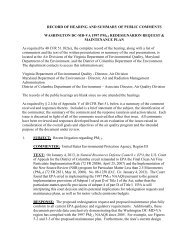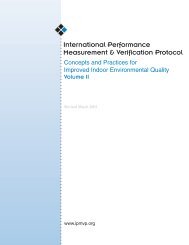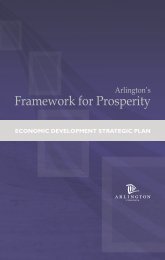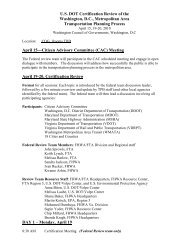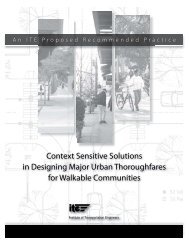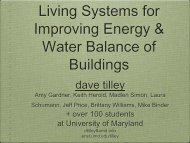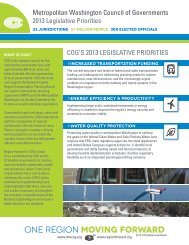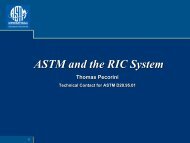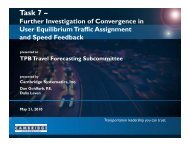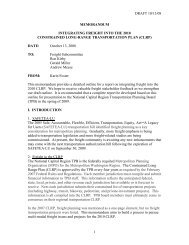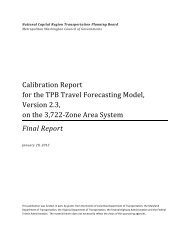PTI Local Government Energy Assurance Guidelines - Metropolitan ...
PTI Local Government Energy Assurance Guidelines - Metropolitan ...
PTI Local Government Energy Assurance Guidelines - Metropolitan ...
Create successful ePaper yourself
Turn your PDF publications into a flip-book with our unique Google optimized e-Paper software.
■■<br />
■■<br />
■■<br />
■■<br />
■■<br />
U. S. Federal <strong>Energy</strong> Regulatory Commission (FERC)<br />
The Federal <strong>Energy</strong> Regulatory Commission is an independent agency that regulates the interstate<br />
transmission of electricity, natural gas, and oil. FERC also reviews proposals to build liquefied natural gas<br />
(LNG) terminals and interstate natural gas pipelines, as well as licensing hydropower projects. It also assists<br />
consumers in obtaining reliable, efficient, and sustainable energy services at a reasonable cost through<br />
appropriate regulatory and market means.<br />
Federal Highway Administration (FHWA)<br />
FHWA has excellent data for transportation-related energy issues. In an emergency, responders will ordinarily<br />
work through the State highway agency for road-related assistance.<br />
Federal Maritime Administration (FMA)<br />
In the event that a State requires long distance waterborne fuel delivery (usually heating oil or gasoline)<br />
aboard an international shipping carrier not registered in the United States, a waiver from the Federal act<br />
requiring the use of U.S.-flagged vessels (the Jones Act) would be sought through the Federal Maritime<br />
Administration and with DOE assistance.<br />
Federal Motor Carrier Safety Administration (FMCSA)<br />
Limits on the number of hours a truck driver can operate a vehicle fall under regulations managed by the<br />
Federal Motor Carrier Safety Administration. These limits can be waived under two conditions. First, if<br />
an emergency has been declared by the President of the United States, the Governor of a State, or their<br />
authorized representative; and second, if the FMCSA Field Administrator has declared that a regional<br />
emergency exists that justifies an exemption. This exemption cannot exceed the duration of the motor carrier’s<br />
or driver’s direct assistance in providing emergency relief to the affected area, or 30 days from the date of the<br />
initial declaration of the emergency or the exemption, whichever is less.<br />
Federal Aviation Administration (FAA)<br />
The Federal Aviation Administration supports the Nation’s airports. Depending on the location and airport<br />
infrastructure of the local jurisdiction, in the event of an aviation fuel shortage it may be necessary to<br />
coordinate with the FAA. This would most likely be handled through the State’s transportation agency and<br />
coordinated at the State emergency operations center. The FAA also has air transportation data useful for<br />
energy assurance planning purposes.<br />
Regional Organizations<br />
<strong>Local</strong> governments should also become familiar with the variety of regional energy organizations affecting them.<br />
These are not just the domain of State agencies. State PUCs usually deal with the Electric Reliability Councils,<br />
the Regional Transmission Operators (RTOs), and the Independent System Operators (ISOs) that coordinate the<br />
distribution of electricity and handle multi-State emergency electrical procedures. Other examples of regional<br />
organizations are the Power Marketing Administrations (PMAs) that operate large hydropower dams under DOE<br />
jurisdiction. The Bonneville Power Administration in the Northwest and the Tennessee Valley Authority in the<br />
Southeast are two such PMAs. In addition, State energy policy organizations such as the Southern States <strong>Energy</strong><br />
Board and the Western Interstate <strong>Energy</strong> Board may provide important coordination during emergencies. Regional<br />
councils of governments (COGs) and metropolitan planning organizations (MPOs) can also have unique expertise<br />
with regard to energy emergencies, beyond their traditional transportation focus.<br />
94 | Appendix E – Additional Agencies and Organizations Relevant to the <strong>Energy</strong> <strong>Assurance</strong> Planning Process



